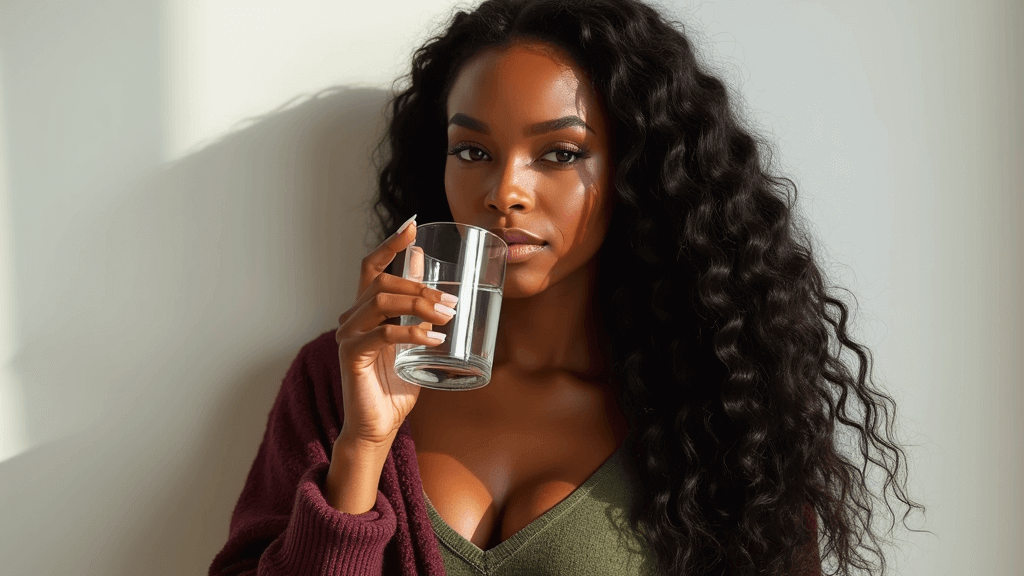Promoting Hair Growth & Strength Through Nutrition

Remember, significant changes in hair growth and strength take time. Be patient and consistent with your dietary habits.
Your hair is a reflection of your overall health. While genetics play a significant role in hair quality, nutrition for hair health is equally vital. This article discusses essential nutrients, the best foods, and dietary habits and good nutrition that can help you achieve stronger, healthier hair.
The foundation of hair health
Hair is primarily made up of protein, specifically a protein called keratin. To maintain healthy hair growth and strength, your body needs a constant supply of nutrients. Let's explore the key players in hair health.
Proteins and amino acids
Proteins are the building blocks for the growth of your hair. Your body breaks down proteins into amino acids, which are then used to create new hair cells. A diet lacking in protein can lead to weak, brittle hair and even hair loss.
Vitamins
Several vitamins play crucial roles in hair health:
-
Vitamin A: Helps produce sebum, an oily substance that moisturizes the scalp
-
Vitamin C: A powerful antioxidant that protects hair follicles from damage
-
Vitamin E: Another antioxidant that supports scalp health
-
B vitamins: Including biotin, niacin, and pantothenic acid, which are essential for hair growth
-
Vitamin D: May help create new hair follicles
Minerals
Key minerals for hair health include:
-
Iron: Carries oxygen to hair follicles
-
Zinc: Supports hair growth and repair
-
Selenium: An antioxidant that protects hair from damage
Omega-3 fatty acids
These essential fatty acids support hair growth and hydrate the hair and scalp.
Best foods for healthy hair growth

To ensure you're getting all the necessary nutrients, incorporate these foods into your diet:
|
Food group |
Examples |
Key nutrients |
|
Protein-rich foods |
Lean meats, fatty fish, eggs, greek yogurt |
Protein, omega-3s, B vitamins |
|
Fruits and vegetables |
Citrus fruits, sweet potatoes, bell peppers, dark leafy greens |
Vitamins A, C, E |
|
Whole grains and nuts |
Oats, quinoa, brazil nuts, sunflower seeds |
B vitamins, zinc, selenium |
|
Dairy products |
Milk, cheese |
Protein, vitamins B12 and D |
The role of hydration in hair health
Water is vital in transporting nutrients to hair follicles and maintaining scalp health. To avoid dry hair, aim to drink at least eight glasses of water daily to support overall health, including your hair.
Nutritional deficiencies and hair loss
Certain nutritional deficiencies can lead to hair problems.
Iron deficiency
Iron deficiency is a common cause of hair loss, particularly in women. It can lead to telogen effluvium, where hair prematurely enters the resting phase of the growth cycle.
Vitamin B deficiency
A lack of B vitamins, especially biotin, can result in hair thinning and loss. While biotin deficiency is rare, it can occur in people with certain genetic disorders or restrictive diets and can play an important role in our self-perception.
Zinc deficiency
Zinc is essential for hair growth and plays a crucial role in protein synthesis and cell division. A deficiency can lead to hair loss and a dry, flaky scalp.
Dietary supplements for hair health
While a well-balanced diet should provide all the nutrients for healthy hair, some people may benefit from supplements. However, consulting with a healthcare provider before starting any supplement regimen is essential.
Popular hair supplements include:
-
Biotin
-
Iron
-
Zinc
-
Vitamin D
-
Omega-3 fatty acids
-
Iron supplements
Remember, there's little evidence that hair growth supplements work for people without nutritional deficiencies. The best approach is usually a balanced diet.
Recipes for healthy hair
Here are two delicious recipes packed with hair-healthy nutrients.
Omega-3 rich salmon bowl
Ingredients:
-
4 oz grilled salmon
-
1/2 cup quinoa
-
1 cup mixed dark leafy greens
-
1/4 avocado
-
1 tbsp pumpkin seeds
-
Lemon juice and olive oil for dressing
Instructions:
-
Grill the salmon and cook the quinoa according to package instructions.
-
Assemble the bowl with greens as the base, topped with quinoa and salmon.
-
Add sliced avocado and sprinkle with pumpkin seeds.
-
Dress with a mixture of lemon juice and olive oil.
This bowl is rich in omega-3s, protein, and various vitamins and minerals essential for hair health.
Nutrient-packed green smoothie
Ingredients:
-
1 cup spinach
-
1/2 banana
-
1/2 cup Greek yogurt
-
1 tbsp chia seeds
-
1/2 cup sweet potato, cooked and cooled
-
1 cup almond milk
-
1 tsp honey (optional)
Instructions:
-
Blend all ingredients until smooth.
-
Add more almond milk if needed to reach desired consistency.
This smoothie is a powerhouse of vitamins A, C, and B-complex, protein, and healthy fats.
Want more health health recipes?
Looking for more recipes that promote the hair growth cycle and hair strength? Check out Ask Debbie About Health & Hair‘s live stream on YouTube:
A healthy diet, proper nutrition, and vibrant hair take discipline
Maintaining healthy hair goes beyond using the right shampoo or styling products. A nutrient-rich diet promotes hair growth, strength, and overall health. By focusing on a balanced diet rich in proteins, vitamins, minerals, and essential fatty acids, you can support the health of your hair from the inside out.
Remember, significant changes in hair growth and strength take time. Be patient and consistent with your dietary habits. If you're experiencing persistent hair problems, consult with a healthcare provider to rule out any underlying health issues.
Find everything you need for healthy hair right here
While nutrition is key to healthy hair, sometimes you want to change your look or add volume and length instantly. That's where Bundle Factory comes in. We offer a wide selection of 100% real Remy human hair bundles, extension multipacks, lace front human hair wigs, and related haircare products.
Visit our store today to explore our range of high-quality hair extensions and wigs. Enjoy free shipping on orders over $149, and remember to subscribe to our mailing list for an instant 10% discount. Plus, earn 2% cashback on all purchases through our BFF rewards program.
Frequently asked questions
What is the best nutrition for healthy hair?
The best nutrition for hair health includes a balance of proteins, vitamins (especially A, C, E, and B-complex), minerals (like iron and zinc), and omega-3 fatty acids. Lean meats, fatty fish, eggs, dark leafy greens, sweet potatoes, nuts, and seeds are all excellent choices. A well-balanced diet that includes a variety of these foods will provide the essential nutrients your hair needs to grow strong and healthy.
What nutritional deficiency causes hair loss?
Several nutritional deficiencies can contribute to hair loss:
-
Iron deficiency is a common cause, especially in women
-
Vitamin D deficiency may lead to hair thinning
-
Zinc deficiency can result in hair loss and a dry, flaky scalp
-
Protein deficiency can cause weak, brittle hair and hair loss
-
B vitamin deficiencies, particularly biotin, can lead to hair thinning
If you're experiencing unexplained hair loss, it's important to consult a healthcare provider. They may recommend blood tests to check for nutrient deficiencies.
What food to eat to prevent hair thinning?
To prevent hair thinning, focus on foods rich in:
-
Protein: Lean meats, fish, eggs, and dairy products
-
Iron: Red meat, spinach, lentils
-
Omega-3 fatty acids: Salmon, sardines, flaxseeds
-
Vitamins A and C: Sweet potatoes, bell peppers, citrus fruits
-
B vitamins: Whole grains, nuts, avocados
-
Zinc: Oysters, beef, pumpkin seeds
Remember, a varied diet, including these foods, is key to providing all the essential nutrients your hair needs.
What nutrition makes hair thicker?
To promote thicker hair, focus on nutrients that support hair follicles and hair growth:
-
Protein: As hair is primarily made of protein, ensuring adequate intake is crucial for thickness.
-
Biotin: This B vitamin plays a significant role in hair growth.
-
Vitamin C: Supports collagen production, which strengthens hair.
-
Iron: Carries oxygen to hair follicles, promoting growth.
-
Omega-3 fatty acids: Support hair growth and provide hydration.
Foods rich in these nutrients include eggs, fatty fish, lean proteins, citrus fruits, berries, spinach, and nuts. While nutrition plays a vital role, remember that hair thickness is also influenced by genetics and overall health. A nutritious diet and proper hair care can help you achieve the healthiest, thickest hair possible for your individual hair type.


